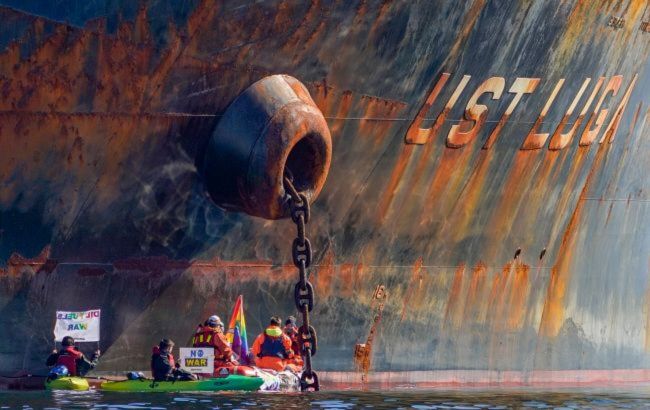Evading sanctions: Albania helping Russia sell oil through network of schemes
 Illustrative photo: Albania helping Russia sell oil (Getty Images)
Illustrative photo: Albania helping Russia sell oil (Getty Images)
Through Albanian ports, banned oil products from Russia and Libya continue to enter the European market.
According to an investigation, the fuel is disguised as construction materials or hidden in specially modified vessels, allowing it to bypass international sanctions and tax inspections, citing a publication by Balkan Insight.
At the start of the year, two ships, Besart and Aya Zanubya, arrived at Porto Romano, on Albania’s coast, declaring cement as their cargo. However, inspections revealed that they were carrying around 600,000 liters of undeclared diesel fuel. Investigators found that the port had repeatedly been used for importing sanctioned oil products from Russia and Libya.
Experts believe that much of the smuggled fuel is of Russian origin, while some arrives from Libyan ports controlled by armed groups.
Smuggling network and bribery
Albanian police have not commented on the investigation, but sources at the Durres port say such operations rely on forged customs declarations and bribery. Smugglers use old vessels sailing under Tanzanian flags and registered to offshore companies, one of them being Batimarine Owner Ship, which handled several such shipments.
Investigators suspect that smugglers used fake contracts and disguised routes as fishing or towing trips to evade checks.
Montenegrin trail and new routes
Between 2013 and 2016, about 1.7 million liters of illegal fuel were brought into Albania from Montenegro, according to investigators. Fishing boats were used as cover, picking up fuel instead of fish and avoiding taxes.
Prosecutors also uncovered a network that used offshore companies to transport hundreds of thousands of liters of diesel. The alleged organizers, Dzhudjin Koka and Sergio Sula, are currently on the run.
Libyan connection and international links
In 2022, another ship, Queen Majeda, arriving from Benghazi, Libya, was seized in Porto Romano. Authorities found 2.6 million liters of marine fuel, whose import is banned in Albania.
The investigation revealed that in Libya, split between rival administrations, oil smuggling funds armed groups. Experts say Russia leverages its ties with Khalifa Haftar’s forces to organize such operations across the Mediterranean.
Fishing boats as cover
Albanian prosecutors are also investigating several cases where fishing vessels carried smuggled fuel from Libya, retrofitted to hold tens of thousands of liters. The shipments were disguised as "fish exchange" operations.
According to the Durres prosecutor’s office, since 2022, more than 750,000 liters of smuggled oil have been seized. The confiscated fuel is of extremely low quality, suitable only for cargo ships and machinery, not for private vehicles.
Albanian authorities admit that illegal fuel imports continue despite sanctions, with Porto Romano and Durres remaining key hubs of the shadow trade. Investigators link the smuggling operations to international criminal networks using aged vessels and offshore entities to conceal real routes.
Meanwhile, India’s refineries have started paying for Russian oil in yuan, with Indian Oil Corp completing several transactions in Chinese currency at traders’ request.
Global oil prices rose following White House statements about potential trade talks with China, which investors saw as a sign of easing tensions between the world’s two largest energy consumers.

